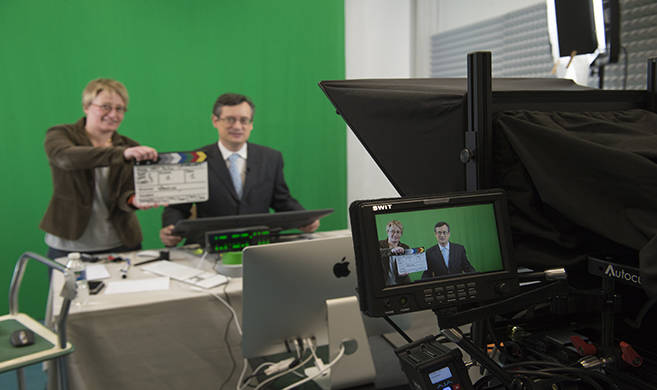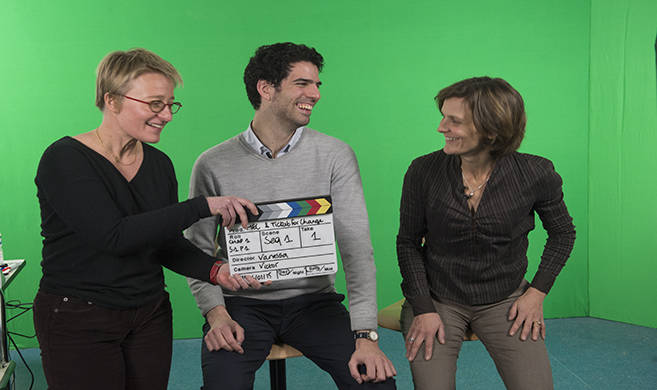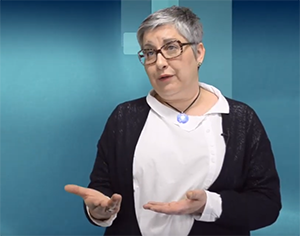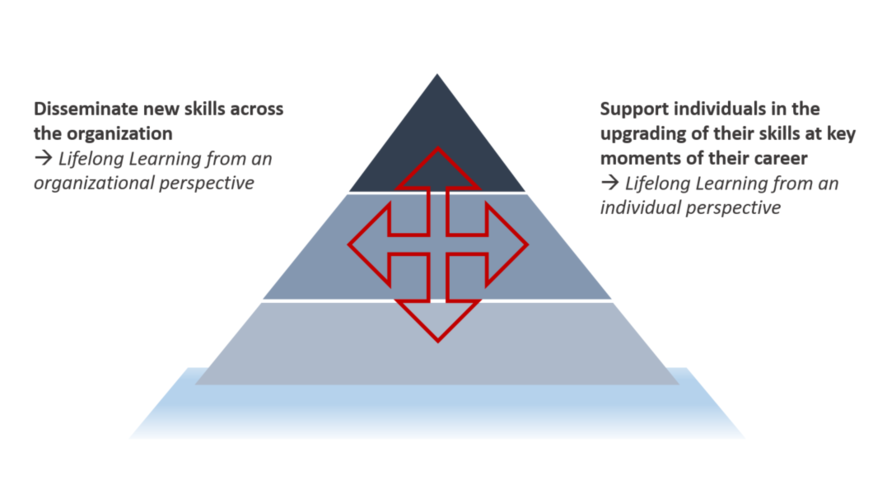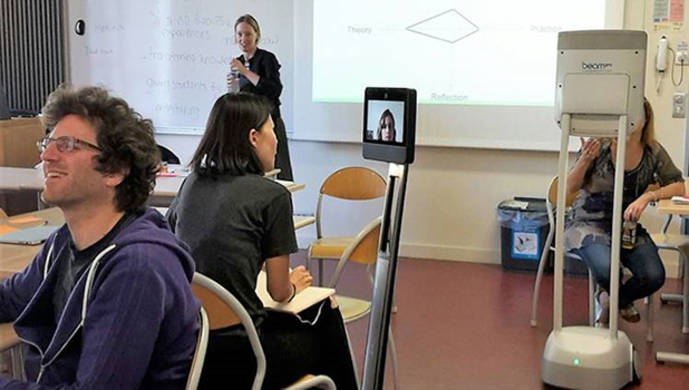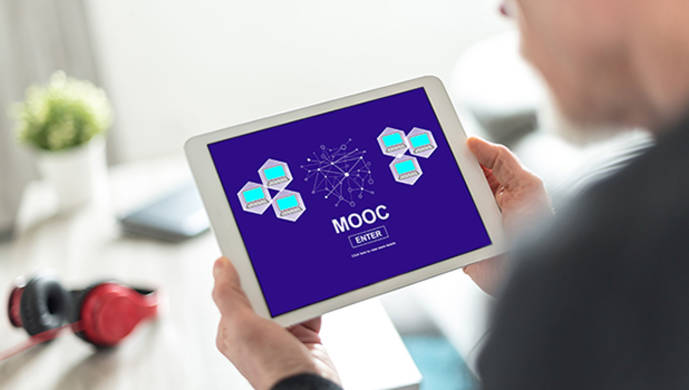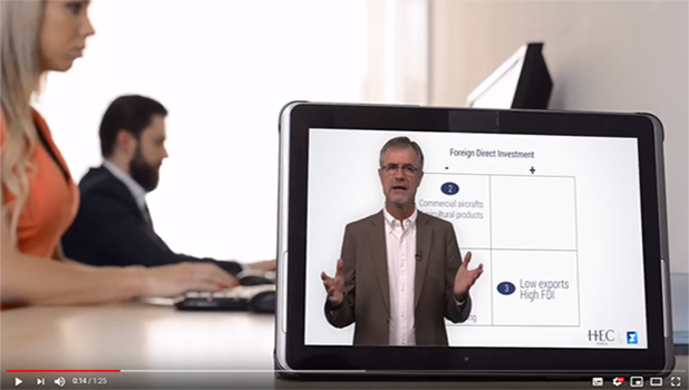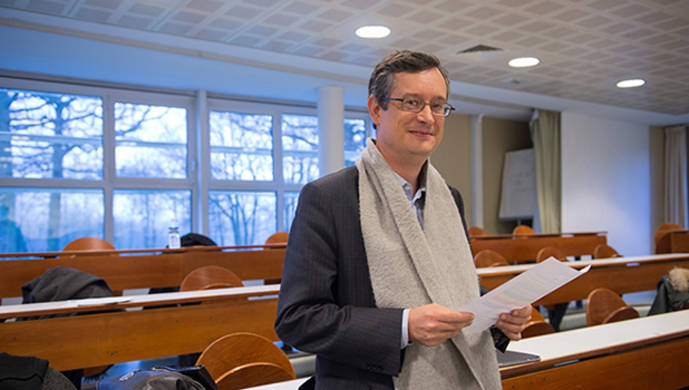How did HEC start to implement online teaching?
Vanessa Klein: The story of online education at HEC started with about 30 courses and conferences posted as podcasts on the Apple’s iTunes U platform in 2010. At this time, we were at the very early steps of open (and free) online content. The most appreciated courses mainly consisted in a video record of in-class video lectures. At that time, we had experimented with very focused 3 to 5 min videos with graphic animations and a professor directly speaking to the user… it ended up as a flop in terms of audience, although it is now the standard of quality for videos in online courses. We were well inspired but the market wasn’t ready yet. Kristine De Valck’s course on Social Media was an international hit, ranked between number 2 and 8 for more than 18 months, providing HEC extremely good global exposure among the best educational institutions in the world.
We were well inspired but the market wasn’t ready yet.
The second wave came with the creation of MOOCs (the term was coined in 2008, but real experiments started in 2012). Alberto Alemanno and Pascal Quiry, who both already took an effective part in the iTunes U project, wanted to experiment with this new form of pedagogy, and institutionally HEC saw an interest in creating more visibility and access to the expertise of its faculty. HEC was among the first European academic partners of Coursera. The company was founded in 2012 and as of today (June 2019), 35 million learners use their learning platform. With its MOOCs (see the list below), HEC reached some 500 000 learners, many of whom did not know the institution before discovering its courses on Coursera.
With its MOOCs, HEC Paris reached some 500 000 learners, many of whom did not know the institution before discovering its courses on Coursera.
MOOC HEC "Devenir Entrepreneur du changement", a collaborative work with "Ticket 4 Change". From left to right: Vanessa Klein, Matthieu Dardaillon, Professor Bénédicte Faivre-Tavignot
The faculty who created the courses also started offering them to on-campus students, in a blended format, in combination with webinars (online synchronous courses) and sometimes in-class sessions. Companies also started to ask for the production of online content for executive education.
A third phase started in January 2015 with the commercial launch of online, fee paying, certificate programs, primarily targeted at working professionals. Professor Pascal Quiry enriched his first MOOC created on Coursera with some additional content bringing to a well-recognized ICCF certification (ICCF @ HEC Paris). While inspired by the pedagogy of MOOCs, the program brought in new features to support participants active engagement and social learning: Regular live sessions and “face to face” meet ups are important milestones in the program to create social bounds with faculty and between participants.
What had originally been designed as a pilot initiative to test the viability of a new business model, turned into a commercial success: The ICCF certificate is now being offered twice a year with cohorts of about 600 participants. Building on the success of this first Finance Certificate, two new programs were soon launched: Strategy @ HEC Paris and ACCF @ HEC Paris.
A fourth phase started with the creation of the first online degree, the Online Master’s in Innovation and Entrepreneurship (MSIE). The scale of the project was daunting. It was like building an airplane while flying it (Learn about the challenges and what explains the success of Online Master’s in these interviews). Again, faculty who produced online courses started using this content in their residential teaching. They also shared this content with colleagues.
The scale of the creation of the first online degree was daunting.
HEC’s venture into the online space is full of pioneering initiatives. How do HEC’s strategy fit into its broader environment?
Karine Le Joly: When they were created in 2012, MOOCs were considered as a major breakthrough for the world of higher education. There is indeed a before and an after the MOOCs. Yet, changes have progressively appeared, which have given rise to new challenges and opportunities. The most important changes relate to economic models. Initially driven by the objective to provide affordable education to underserved audiences worldwide, MOOCs platforms’ early strategy was based on volume and very low prices through “freemium” pricing schemes. This volume-based model, positioned at the bottom of the pyramid, has now clearly been replaced by a more exclusive model, moving up the pyramid of talents by addressing more traditional executive audiences with more sophisticated offers. This upmarket strategy is being implemented by both historical MOOCs platforms, such as Coursera or EdX, but also by new players (eg. Get Smarter, ExecOnline).
This volume-based model has now clearly been replaced by a more exclusive model, with more sophisticated offers.
The emerging competitive landscape may be seen a threat to business schools’ traditional programs, and especially to Executive Education. It is also full of promises for those who keep on innovating. Time has proved the relevance of some of HEC’s choices: The professional Certificate model, tried out by HEC at a very early stage, has now become a prevalent model among the best business schools; Online degrees have gained undeniable legitimacy.
The professional Certificate model, tried out by HEC at a very early stage, has now become a prevalent model among the best business schools.
What can be expected to come next? Especially in terms of managers’ talent development?
Karine LeJoly: New and exciting avenues for digital learning and, more specifically, for online offerings come along the notion of “Lifelong Learning”. Lifelong learning is a necessity for every manager, because of the unprecedented transformation of work, brought by the digital revolution but also environmental and social challenges. Ongoing skills development is not new. Yet, change occurs at a scale and speed that makes it critical for individuals to continuously invest in their careers and stay attuned to emerging jobs and competencies: once linear, career pathways need to be constantly reinvented. At the same time, the transformation of organizations looking for agile processes, flatter structures, project-based teamwork and innovation, opens up new needs for the development of transversal and soft skills at every level of the talent pipeline.
Lifelong learning is a necessity for every manager because of the unprecedented transformation of work.
Those transformations pave out the way for Executive Education.
While degree and certificate programs remain highly relevant to support major career moves, complementary solutions should be looked for in order to serve increasingly diverse skill-enhancements needs. These may lie in the development of portfolios of short, flexible learning units, which may be combined and assembled as part of customized learning pathways by individuals and companies alike.
Business Online Education ©macrovector on AdobeStock
HEC Paris Executive Education has embarked into such a journey, and the digital learning format surely has a piece to play in this journey as it brings scale and flexibility. The Executive Education and Digital teams are currently working on the creation of a new 100% online offering for companies, jointly created and delivered with École Polytechnique and Sciences Po Paris. This project specifically aims at helping companies meet the challenges of lifelong learning. It will certainly unveil a new phase is HEC Paris’ history of continuous digital innovation.
MOOCs at HEC Paris
MOOCs available on Coursera include:
- Managing Innovation and Design Thinking specialization, a first taste of the full MSc in Innovation and Entrepreneurship (MSIE)
- Inspirational Leadership: Leading with Sense, 4-MOOC Specialization, with Valérie Gauthier
- Devenir entrepreneur du changement (HEC Paris & Ticket for Change) with Florian Hoos, Frédéric Dalsace, Bénédicte Faivre-Tavignot, Lise Penillard, Nathalie Lugagne and external contributors, on how to encourage social solidarity through entrepreneurship and other topics. Learn more on the project.
- Creating and Developing a Tech Startup with Romain Beaume (École Polytechnique) and Etienne Krieger
- (Re)-invent your business model with the Odyssey 3.14 approach with Laurence Lehmann-Ortega and Hélène Musikas
- Anticipating Your Next Battle, in Business and Beyond with Jeremy Ghez
- Investment Management in an Evolving and Volatile World with Hugues Langlois and a number of experts from AXA-Investment Managers, among which Marion Le Morhedec
Executive Online Certificates available on FFI include:
- International Certificate in Corporate Finance (ICCF @ HEC Paris), with Pascal Quiry, offering a comprehensive curriculum targeting a wide audience of executives from different backgrounds and sectors
- Advanced Certificate in Corporate Finance (ACCF @ HEC Paris) with Pascal Quiry
- Strategy @ HEC Paris with Pierre Dussauge.
All our MOOCS are offered with English and French subtitles.
See all the MOOCs here.
